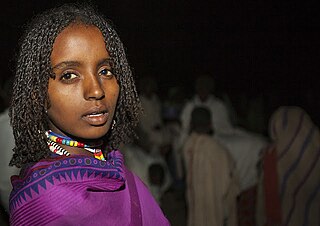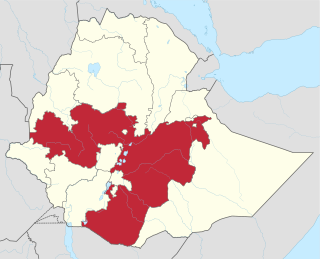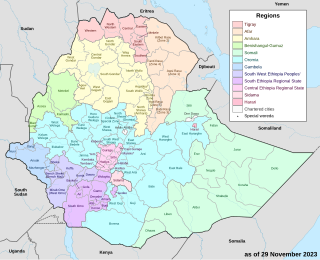Related Research Articles

The Oromo are a Cushitic ethnic group native to the Oromia region of Ethiopia and parts of Northern Kenya. They speak the Oromo language, which is part of the Cushitic branch of the Afroasiatic language family. They are one of the largest ethnic groups in Ethiopia. According to the last Ethiopian census of 2007, the Oromo numbered 25,488,344 people or 34.5% of the Ethiopian population. Recent estimates have the Oromo compromising 35.8% of the estimated 116,000,000 Ethiopian population placing Oromos at a population of 41,000,000

Oromo, historically also called Galla, is an Afroasiatic language that belongs to the Cushitic branch. It is native to the Ethiopian state of Oromia and Northern Kenya and is spoken predominantly by the Oromo people and neighboring ethnic groups in the Horn of Africa. It is used as a lingua franca particularly in the Oromia Region and northeastern Kenya.

Oromia is a regional state in Ethiopia and the homeland of the Oromo people. The capital of Oromia is Addis Ababa (Finfinne).

Kenya is a multilingual country. The two official languages of Kenya, Swahili and English are widely spoken as lingua francas; however, including second-language speakers, Swahili is more widely spoken than English. Swahili is a Bantu language native to East Africa and English is inherited from British colonial rule.

The languages of Ethiopia include the official languages of Ethiopia, its national and regional languages, and a large number of minority languages, as well as foreign languages.

East Welega is one of the zones in the central Oromia Region of Ethiopia. This administrative division acquired its name from the former province of Welega. Towns and cities in this zone include Nekemte.

The Orma is one of the Oromo clans in the Horn of Africa who predominantly live in Tana River County in northern Kenya and in southern Ethiopia. They share a common language and cultural heritage with Oromo clans. First and foremost they are pastoralists and almost all are Muslims. In 2019 the Orma numbered 158,993.
Southern Oromo, or Borana, is a variety of Oromo spoken in southern Ethiopia and northern Kenya by the Borana people. Günther Schlee also notes that it is the native language of a number of related peoples, such as the Sakuye.
Orma may refer to:
Oromo may refer to:
Eastern Oromo is a form of Oromo language spoken in the East Hararghe Zone, West Hararghe Zone and northern Bale Zone of the Oromia Region of Ethiopia.
The Oromoid languages are a branch of Lowland East Cushitic languages that includes the most populous Cushitic language, Oromo, and the closely related Konsoid dialect cluster.

Slavery in Somalia existed as a part of the East African slave trade. To meet the demand for menial labor, Bantus from southeastern Africa slaves were exported from the Zanzibar and were sold in cumulatively large numbers over the centuries to customers in East Africa and other areas in Northeast Africa and Asia. People captured locally during wars and raids were also sometimes captured by Somalis and Ethiopians, Oromo and Nilotic origin. However, the perception, capture, treatment and duties of both groups of slaves differed markedly, with Oromo favored because Oromo subjects were not viewed as linguistically and culturally different by their Somali owners.
The Waata, or Sanye, are an Oromo-speaking people of Kenya and former hunter-gatherers. They share the name Sanye with the neighboring Dahalo.

The Oromo conflict is a protracted conflict between the Oromo Liberation Front (OLF) and the Ethiopian government. The Oromo Liberation Front formed to fight the Ethiopian Empire to liberate the Oromo people and establish an independent state of Oromia. The conflict began in 1973, when Oromo nationalists established the OLF and its armed wing, the Oromo Liberation Army (OLA). These groups formed in response to prejudice against the Oromo people during the Haile Selassie and Derg era, when their language was banned from public administration, courts, church and schools, and the stereotype of Oromo people as a hindrance to expanding Ethiopian national identity.
Wardey is a Somali clan who currently associated with the Dir clan family specifically the Madahweyne sub-clan found in southern Somalia and eastern Kenya, mostly along the Tana River. The Wardey are a pastoralist community. Mostly they live in Tana River County alongside Orma communities. They speak the Somali language and practice Islam.
Munyo is a variety of the Oromo language spoken by the Munyoyaya of northeast Tana River County in Kenya. It is similar to the neighbouring Orma language and is regarded as a dialect of Orma by Ethnologue.

Cushitic-speaking peoples are the ethnolinguistic groups who speak Cushitic languages natively. Today, Cushitic languages are spoken primarily in the Horn of Africa, with minorities speaking Cushitic languages to the north and south in Egypt, Sudan, Kenya, and Tanzania.
Orma is a village in Pella regional unit, Macedonia, Greece.
References
- ↑ Orma at Ethnologue (26th ed., 2023)

- Hoskins (2011) Phonology of the Orma language